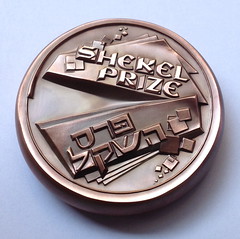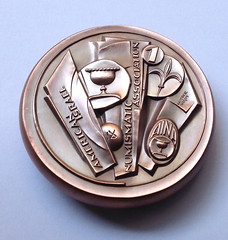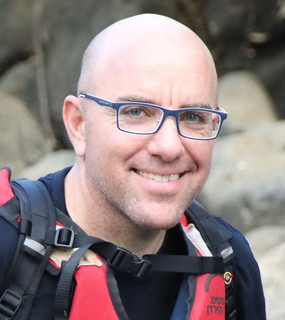
PREV ARTICLE
NEXT ARTICLE
FULL ISSUE
PREV FULL ISSUE
YOAV FARHI WINS SHEKEL PRIZEMel Wacks forwarded this announcement of the winner of this year's Shekel Prize. Thanks! -Editor
The Board Of Directors of the American Israel Numismatic Association has created the Shekel Prize, that will be given annually to the author of the best book published on the subject of Ancient Judaean, Holy Land, Israel, or Jewish Numismatics. The judging committee consists of Mel Wacks, David Hendin, Ira Rezak, Steve Album and Allen Berman.   The Shekel Prize is an extremely high relief 3-inch medal designed by Victor Huster. Featured are three shekel designs—from a c. 8th century BCE shekel stone weight, a shekel of the First Revolt (66-70 CE), and 1-new shekel (issued by Israel beginning in 1985).
This is Farhi’s first book. His MA thesis (2004) was The Coinage of the City of Lod (Diospolis) from the Roman Period to the End of the Early Islamic Period (Hebrew), and Farhi’s Doctoral Dessertation (2013) was The Coinage of Gaza in the Roman Period (1st Century BCE-3rd Century CE). The winning book’s content is described by the publisher, The Israel Exploration Society: More than 600 coins and related objects were found at Khirbet Qeiyafa during the 2007–2013 excavation seasons. The earliest coins date from the end of the sixth century BCE and the latest from the British Mandate. These coins almost all relate to three phases in the history of the site following the Iron Age occupation: the Late Persian–Early Hellenistic period (late fourth–early third centuries BCE), the Hasmonaean period up to the destruction of the Second Temple (first century BCE–first century CE) and the Late Roman and Byzantine periods (fourth–fifth centuries CE). The numismatic finds from the Late Persian–Early Hellenistic period are extraordinary in their amount and rarity and include many types that were hitherto unknown from controlled excavations. The variety of coins that were found – imported Archaic and Classical Greek coins, coins from Phoenicia, local coins from mints in Jerusalem, Philistia, Samaria and possibly Edom, as well as Macedonian and Ptolemaic coins – contributes a great deal to our knowledge of the monetary economy of Judaea and its neighbours during the transition from the Persian to the Hellenistic period. The exposure of this stratum and its numerous small finds is of great significance for the study of the transition from the Persian to the Hellenistic period in this region, since no site exposed so far in Israel in general, or in this region in particular, contains a comparable single-period occupation stratum that can be so precisely dated to this period. Other publications in the running for the 2017 Shekel Prize were “Jewish History in the Bible Portrayed in Coins” by Dr. John G. Leslie and “The New York Sale Auction XXXIX of Ancient Coins Featuring The Brody Family Collection of Ancient Jewish Coins” cataloged by Ira & Larry Goldberg Auctioneers, Baldwin’s, Dmitry Markov, and M & M Numismatics Ltd. Mel adds: By the way, I believe that I learned about Yoav's book from The E-Sylum! Wayne Homren, Editor The Numismatic Bibliomania Society is a non-profit organization promoting numismatic literature. See our web site at coinbooks.org. To submit items for publication in The E-Sylum, write to the Editor at this address: whomren@gmail.com To subscribe go to: https://my.binhost.com/lists/listinfo/esylum All Rights Reserved. NBS Home Page Contact the NBS webmaster 
|
